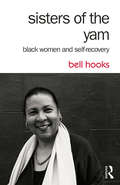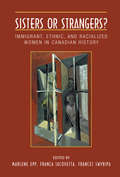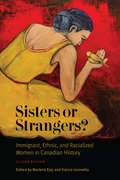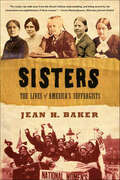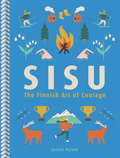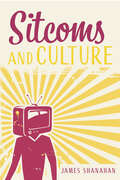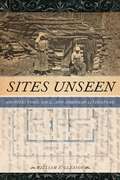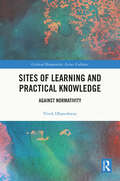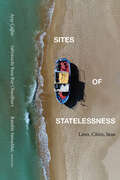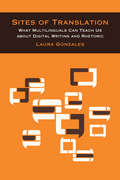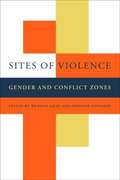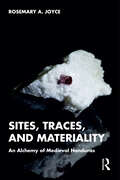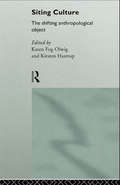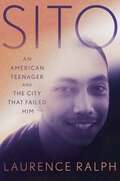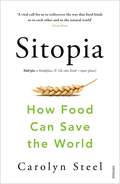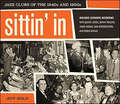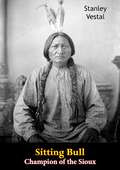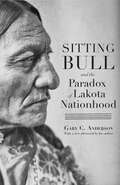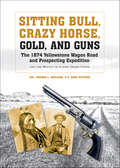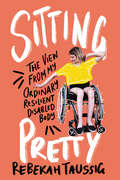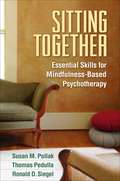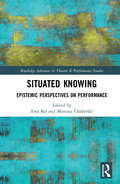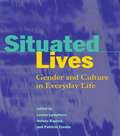- Table View
- List View
Sisters of the Yam: Black Women and Self-Recovery
by Bell HooksIn Sisters of the Yam, bell hooks reflects on the ways in which the emotional health of black women has been and continues to be impacted by sexism and racism. Desiring to create a context where black females could both work on their individual efforts for self-actualization while remaining connected to a larger world of collective struggle, hooks articulates the link between self-recovery and political resistance. Both an expression of the joy of self-healing and the need to be ever vigilant in the struggle for equality, Sisters of the Yam continues to speak to the experience of black womanhood.
Sisters or Strangers?
by Marlene Epp Franca Iacovetta Frances SwyripaSpanning two hundred years of history from the nineteenth century to the 1990s, Sisters or Strangers? explores the complex lives of immigrant, ethnic, and racialized women in Canada. The volume deals with a cross-section of peoples - including Japanese, Chinese, Black, Aboriginal, Irish, Finnish, Ukrainian, Jewish, Mennonite, Armenian, and South Asian Hindu women - and diverse groups of women, including white settlers, refugees, domestic servants, consumer activists, nurses, wives, and mothers.The central themes of Sisters or Strangers? include discourses of race in the context of nation-building, encounters with the state and public institutions, symbolic and media representations of women, familial relations, domestic violence and racism, and analyses of history and memory. In different ways, the authors question whether the historical experience of women in Canada represents a 'sisterhood' of challenge and opportunity, or if the racial, class, or marginalized identity of the immigrant and minority women made them in fact 'strangers' in a country where privilege and opportunity fall according to criteria of exclusion. Using a variety of theoretical approaches, this collaborative work reminds us that victimization and agency are never mutually exclusive, and encourages us to reflect critically on the categories of race, gender, and the nation.
Sisters or Strangers?: Immigrant, Ethnic, and Racialized Women in Canadian History - Second Edition
by Marlene Epp Franca IacovettaSpanning more than two hundred years of history, from the eighteenth century to the twenty-first, Sisters or Strangers? explores the complex lives of immigrant, ethnic, and racialized women in Canada. Among the themes examined in this new edition are the intersection of race, crime, and justice, the creation of white settler societies, letters and oral histories, domestic labour, the body, political activism, food studies, gender and ethnic identity, and trauma, violence, and memory.The second edition of this influential essay collection expands its chronological and conceptual scope with fifteen new essays that reflect the latest cutting-edge research in Canadian women's history. Introductions to each thematic section include discussion questions and suggestions for further reading, making the book an even more valuable classroom resource than before.
Sisters: The Lives of America's Suffragists
by Jean H. BakerJean H. Baker's Sisters shows how the personal became political In the fight to grant women civil rights.They forever changed America: Lucy Stone, Susan B. Anthony, Elizabeth Cady Stanton, Frances Willard, Alice Paul. At their revolution's start in the 1840s, a woman's right to speak in public was questioned. By its conclusion in 1920, the victory in woman's suffrage had also encompassed the most fundamental rights of citizenship: the right to control wages, hold property, to contract, to sue, to testify in court. Their struggle was confrontational (women were the first to picket the White House for a political cause) and violent (women were arrested, jailed, and force-fed in prisons). And like every revolutionary before them, their struggle was personal.For the first time, the eminent historian Jean H. Baker tellingly interweaves these women's private lives with their public achievements, presenting these revolutionary women in three dimensions, humanized, and marvelously approachable.
Sisu: The Finnish Art Of Courage
by Joanna NylundDiscover the Finnish quality of sisu and how cultivating it can help you lead a life of greater purpose and happiness.This ancient Finnish word describes an attitude of courage, resilience, grit, tenacity and perseverance. This key psychological competence enables extraordinary action in times of adversity. To have sisu confers a further dimension of doing so with honesty, integrity and humility.By cultivating sisu you can: Face life's challenges with courage and determination Enhance your wellbeing and find your focus Communicate confidently and resolve conflicts effectively Cultivate endurance and achieve your fitness goals Raise kind and resilient children Act with integrity and fight for what you believe inSisu is a universal trait. It may have been bottled and labelled by the Finns, but it is within reach of everyone. It lies within you, and you are very likely to have used it already.
Sisu: The Finnish Art of Courage
by Joanna NylundDiscover the Finnish quality of sisu and how cultivating it can help you lead a life of greater purpose and happiness.This ancient Finnish word describes an attitude of courage, resilience, grit, tenacity and perseverance. This key psychological competence enables extraordinary action in times of adversity. To have sisu confers a further dimension of doing so with honesty, integrity and humility.By cultivating sisu you can: Face life's challenges with courage and determination Enhance your wellbeing and find your focus Communicate confidently and resolve conflicts effectively Cultivate endurance and achieve your fitness goals Raise kind and resilient children Act with integrity and fight for what you believe inSisu is a universal trait. It may have been bottled and labelled by the Finns, but it is within reach of everyone. It lies within you, and you are very likely to have used it already.
Sitcoms and Culture (Comedy & Culture)
by James ShanahanDoes it matter what television we watch? Despite their stodgy reputation among many consumers of television, sitcoms, or situation comedies, have stuck around as a cornerstone of the television landscape.Sitcoms and Culture examines sitcoms as cultural artifacts ripe for exploration as they reflect the shifting landscapes of our society. From questions of social change to the portrayal of women and other racial, ethnic, and sexual minorities, sitcoms have evolved alongside the major social changes of the last half century. Using an interdisciplinary approach, author James Shanahan combines research on cultural indicators with an empirical methodology and cultural analysis to examine over 50 years of sitcoms to discern the reality of how these comedies have portrayed life to us across generations of television.Sitcoms and Culture helps us gain a deeper understanding of how sitcoms mirror and shape societal norms and of the pivotal role they have played in reflecting and influencing cultural trends.
Sites Unseen: Architecture, Race, and American Literature (America and the Long 19th Century #23)
by William A. GleasonSites Unseen examines the complex intertwining of race and architecture in nineteenth and early-twentieth century American culture, the period not only in which American architecture came of age professionally in the U.S. but also in which ideas about architecture became a prominent part of broader conversations about American culture, history, politics, and—although we have not yet understood this clearly—race relations. This rich and copiously illustrated interdisciplinary study explores the ways that American writing between roughly 1850 and 1930 concerned itself, often intensely, with the racial implications of architectural space primarily, but not exclusively, through domestic architecture.In addition to identifying an archive of provocative primary materials, Sites Unseen draws significantly on important recent scholarship in multiple fields ranging from literature, history, and material culture to architecture, cultural geography, and urban planning. Together the chapters interrogate a variety of expressive American vernacular forms, including the dialect tale, the novel of empire, letters, and pulp stories, along with the plantation cabin, the West Indian cottage, the Latin American plaza, and the “Oriental” parlor. These are some of the overlooked plots and structures that can and should inform a more comprehensive consideration of the literary and cultural meanings of American architecture. Making sense of the relations between architecture, race, and American writing of the long nineteenth century—in their regional, national, and hemispheric contexts—Sites Unseen provides a clearer view not only of this catalytic era but also more broadly of what architectural historian Dell Upton has aptly termed the social experience of the built environment.
Sites Unseen: Uncovering Hidden Hazards in American Cities (Amer Sociological Association's Rose Ser)
by Harvey Molotch Scott Frickel James R. ElliottFrom a dive bar in New Orleans to a leafy residential street in Minneapolis, many establishments and homes in cities across the nation share a troubling and largely invisible past: they were once sites of industrial manufacturers, such as plastics factories or machine shops, that likely left behind carcinogens and other hazardous industrial byproducts. In Sites Unseen, sociologists Scott Frickel and James Elliott uncover the hidden histories of these sites to show how they are regularly produced and reincorporated into urban landscapes with limited or no regulatory oversight. By revealing this legacy of our industrial past, Sites Unseen spotlights how city-making has become an ongoing process of social and environmental transformation and risk containment. To demonstrate these dynamics, Frickel and Elliott investigate four very different cities—New Orleans, Minneapolis, Philadelphia, and Portland, Oregon. Using original data assembled and mapped for thousands of former manufacturers’ locations dating back to the 1950s, they find that more than 90 percent of such sites have now been converted to urban amenities such as parks, homes, and storefronts with almost no environmental review. And because manufacturers tend to open plants on new, non-industrial lots rather than on lots previously occupied by other manufacturers, associated hazards continue to spread relatively unabated. As they do, residential turnover driven by gentrification and the rising costs of urban living further obscure these sites from residents and regulatory agencies alike. Frickel and Elliott show that these hidden processes have serious consequences for city-dwellers. While minority and working class neighborhoods are still more likely to attract hazardous manufacturers, rapid turnover in cities means that whites and middle-income groups also face increased risk. Since government agencies prioritize managing polluted sites that are highly visible or politically expedient, many former manufacturing sites that now have other uses remain invisible. To address these oversights, the authors advocate creating new municipal databases that identify previously undocumented manufacturing sites as potential environmental hazards. They also suggest that legislation limiting urban sprawl might reduce the flow of hazardous materials beyond certain boundaries. A wide-ranging synthesis of urban and environmental scholarship, Sites Unseen shows that creating sustainable cities requires deep engagement with industrial history as well as with the social and regulatory processes that continue to remake urban areas through time. A Volume in the American Sociological Association's Rose Series in Sociology.
Sites of Learning and Practical Knowledge: Against Normativity (Critical Humanities Across Cultures)
by Vivek DhareshwarThis book examines the relationship between cultural difference and practical knowledge and its implications for the study of humanities and the social sciences. It sketches a meta-theory of Western thought to grasp the conceptual distortions that result when a normatively structured theoretical way of understanding the world seeks to displace practical forms of understanding. The book draws on both Western thinkers such as Nietzsche, Marx, Wittgenstein and Foucault and Indian thinkers such as Gandhi, Tagore and Balagangadhara to formulate a practical epistemology that delimits theoretical knowledge by regenerating experiential knowledge that was the hallmark of Indian intellectual traditions and provides the intellectual resources for rejecting normativity. By thus preparing the ground for a radical reconceptualization of the human sciences it seeks to overcome the loss of concepts and the violence generated by the grafting of ill–understood and experience-occluding normative conceptual structures on the fabric of practical life. Finally, the author offers an alternative conceptualization of Indian sociality through the idea of a practitional matrix, which explains both why the West necessarily misunderstood or misdescribed India and how that misdescription enables us to theorize the West. Part of Critical Humanities across Cultures series, this book will be an essential read for scholars and researchers of philosophy, anthropology, sociology, religious studies, post-colonial studies, cultural studies, Indian studies and literature.
Sites of Statelessness: Laws, Cities, Seas (SUNY series in Global Modernity)
by Ayşe Çağlar; Sabyasachi Basu Ray Chaudhury; Ranabir SamaddarStatelessness is incessantly produced in seas, cities, and law. Building around the postcolonial experiences of statelessness Sites of Statelessness examines the entanglements of citizenship policies and practices with the spread of statelessness in contemporary times, something that defies any kind of a citizen/stateless binary. These policies are significant, the background of a shift in emphasis from jus soli to jus sanguinis, the proliferation of borderland populations and nowhere people, population flows across (post)colonial border formations and boundary delimitations, and the growth of regional, formal, and informal labor markets characterized by immigrant labor economies. In this context, contributors address the distinctive dynamics of the different sites in the production of statelessness and considers the impact of these sites as critical and does not merely treat them as a backdrop. They argue that these different sites evoke different histories and repertoires and also bring different possibilities of alignment with emerging problematics.
Sites of Translation: What Multilinguals Can Teach Us about Digital Writing and Rhetoric (Sweetland Digital Rhetoric Collaborative)
by Laura GonzalesWinner of the 2016 Sweetland Digital Rhetoric Collaborative Book Prize Sites of Translation illustrates the intricate rhetorical work that multilingual communicators engage in as they translate information for their communities. Blending ethnographic and empirical methods from multiple disciplines, Laura Gonzales provides methodological examples of how linguistic diversity can be studied in practice, both in and outside the classroom, and provides insights into the rhetorical labor that is often unacknowledged and made invisible in multilingual communication. Sites of Translation is relevant to researchers and teachers of writing as well as technology designers interested in creating systems, pedagogies, and platforms that will be more accessible and useful to multilingual audiences. Gonzales presents multilingual communication as intellectual labor that should be further valued in both academic and professional spaces, and supported by multilingual technologies and pedagogies that center the expertise of linguistically diverse communicators.
Sites of Violence: Gender and Conflict Zones
by Jennifer Hyndman Wenona GilesIn this book, militarization, nationalism, and globalization are scrutinized at sites of violent conflict from a range of feminist perspectives.
Sites, Traces, and Materiality: An Alchemy of Medieval Honduras
by Rosemary A. JoyceSites, Traces, and Materiality proposes a new materialist model for archaeology that brings together the concept of site ontology from geography, a novel analysis of archaeological materiality as traces, and engagement with the concept of animacy hierarchy, in order to explore how geological materials can be reconceived as active.Using a sustained analysis of ancient Honduras, the book provides a contribution to global medieval studies showing how the concept of alchemy can help foreground the kinds of experiential knowledge indigenous people used to advance their technological engagements with mineral matter. Addressing a concern often raised with new materialist work in archaeology, the book relies on indigenous philosophy of the contemporary and historic Lenca people-- the descendants of the people who created the archaeological locales the book examines-- for guidance on how to think about minerals as lively. Taking seriously contemporary Lenca concerns with threats to water and land from global industries, the book links the archaeological case study to the present day politics of mineral extraction.Intended for readers interested in history, archaeology, and cultural studies, the book is accessibly written and appropriate for students as well as academics.
Siting Culture: The Shifting Anthropological Object
by Kirsten Hastrup Karen Fog OlwigCulture has been subject to critical debate in anthropology during the past decade and this is related to a shift in emphasis from the bounded local culture to transnational cultural flows. At the same time that cultural mobility is being emphasized, the people studied by anthropologists are recasting culture as a place of belonging as they construct local identities within global fields of relations.So far, much of the analysis of the role of place in culture has been carried out at a level of theoretical debate. Siting Culture argues that it is only through rich ethnographic studies that anthropologists may explore the significance of place in the global space of relations which mould the lives of people throughout the world. By examining the concept of culture through case studies from Europe, Africa, Oceania, Latin America and the Caribbean it probes the methodological and theoretical implications of the divergent scholarly and popular concepts of culture.
Sito: An American Teenager and the City that Failed Him
by Laurence RalphA riveting and heart-wrenching story of violence, grief and the American justice system, exploring the systemic issues that perpetuate gang participation in one of the wealthiest cities in the country, through the story of one teenager. In September of 2019, Luis Alberto Quiñonez—known as Sito— was shot to death as he sat in his car in the Mission District of San Francisco. He was nineteen. His killer, Julius Williams, was seventeen. It was the second time the teens had encountered one another. The first, five years before, also ended in tragedy, when Julius watched as his brother was stabbed to death by an acquaintance of Sito&’s. The two murders merited a few local news stories, and then the rest of the world moved on. But for the families of the slain teenagers, it was impossible to move on. And for Laurence Ralph, the stepfather of Sito&’s half-brother who had dedicated much of his academic career to studying gang-affiliated youth, Sito&’s murder forced him to revisit a subject of scholarly inquiry in a profoundly different, deeply personal way. Written from Ralph's perspective as both a person enmeshed in Sito's family and as an Ivy League professor and expert on the entanglement of class and violence, SITO is an intimate story with an message about the lived experience of urban danger, and about anger, fear, grief, vengeance, and ultimately grace.
Sitopia: How Food Can Save the World
by Carolyn Steel'A visionary look at how quality food should replace money as the new world currency' Tim Spector'Hugely ambitious and beautifully written...destined to become a modern classic' Bee WilsonHow we search for, make and consume food has defined human history. It transforms our bodies and homes, our politics and our trade, our landscapes and our climate. But by forgetting our culinary heritage and relying on cheap, intensively produced food, we have drifted into a way of life that threatens our planet and ourselves.What if there were a more sustainable way to eat and live? Drawing on many disciplines, as well as stories of the farmers, designers and economists who are remaking our relationship with food, this inspiring and deeply thoughtful book gives us a provocative and exhilarating vision for change, and points the way to a better future.'Utterly brilliant' Thomasina MiersWINNER OF THE 2021 GUILD FOOD OF WRITERS AWARD FOR BEST FOOD BOOK*Shortlisted for the Wainwright Prize 2020*
Sittin' In: Jazz Clubs of the 1940s and 1950s
by Jeff GoldA visual history of America’s jazz nightclubs of the 1940s and 1950s, featuring exclusive interviews and over 200 souvenir photos.In the two decades before the Civil Rights movement, jazz nightclubs were among the first places that opened their doors to both Black and white performers and club goers in Jim Crow America. In this extraordinary collection, Grammy Award-winning record executive and music historian Jeff Gold looks back at this explosive moment in the history of Jazz and American culture, and the spaces at the center of artistic and social change. Sittin’ In is a visual history of jazz clubs during these crucial decades when some of the greatest names in in the genre—Billie Holiday, Charlie Parker, Ella Fitzgerald, Dizzy Gillespie, Miles Davis, Louis Armstrong, Oscar Peterson, and many others—were headlining acts across the country. In many of the clubs, Black and white musicians played together and more significantly, people of all races gathered together to enjoy an evening’s entertainment. House photographers roamed the floor and for a dollar, took picture of patrons that were developed on site and could be taken home in a keepsake folder with the club’s name and logo.Sittin’ In tells the story of the most popular club in these cities through striking images, first-hand anecdotes, true tales about the musicians who performed their unforgettable shows, notes on important music recorded live there, and more. All of this is supplemented by colorful club memorabilia, including posters, handbills, menus, branded matchbooks, and more. Inside you’ll also find exclusive, in-depth interviews conducted specifically for this book with the legendary Quincy Jones; jazz great tenor saxophonist Sonny Rollins; Pulitzer Prize-winning fashion critic Robin Givhan; jazz musician and creative director of the Kennedy Center, Jason Moran; and jazz critic Dan Morgenstern.Gold surveys America’s jazz scene and its intersection with racism during segregation, focusing on three crucial regions: the East Coast (New York, Atlantic City, Boston, Washington, D.C.); the Midwest (Chicago, Cleveland, Detroit, St. Louis, Kansas City); and the West Coast (Los Angeles, San Francisco). This collection of ephemeral snapshots tells the story of an era that helped transform American life, beginning the move from traditional Dixieland jazz to bebop, from conservatism to the push for personal freedom.
Sitting Bull Champion of the Sioux
by Stanley Vestal"If that is Long Hair, I am the one who killed him," White Bull, the young nephew of Sitting Bull, said when Bad Juice pointed out Custer's body immediately after the Battle of the Little Big Horn. Yet it was Sitting Bull who acquired the notoriety and was paraded in Buffalo Bill's Wild West Show as "the warrior who killed Custer." But this new edition of Stanley Vestal's classic biography of the famous chief emphasizes that "Sitting Bull's fame does not rest upon the death of Custer’s five troops. Had he been twenty miles away shooting antelope that morning, he would still remain the greatest of the Sioux."The stirring account of the death throes of a mighty nation and its leader is the story of the "greatest of the Sioux" and his struggle to keep his people free and united. The Sioux were formidable warriors, as attested to by men who fought against them, like General Anson Mills, who said, "They were the best cavalry in the world; their like will never be seen again," but they were up against an overwhelming tide of soldiers, homesteaders, and bureaucrats. Sitting Bull fought long and hard and "He was ... a statesman, one of the most farsighted we have had," but statesmanship could not prevail against such odds.-Print ed.
Sitting Bull and the Paradox of Lakota Nationhood
by Gary C. AndersonIn this newly revised biography, Sitting Bull and the Paradox of Lakota Nationhood, Gary C. Anderson offers a new interpretation of Sitting Bull&’s conflict with General George Custer at Little Big Horn and its aftermath, and details the events and life experiences that ultimately led Sitting Bull into battle. Incorporating the latest scholarship, Anderson profiles this military and spiritual leader of the Lakota people, a man who remained a staunch defender of his nation and way of life until his untimely death.Sitting Bull and the Paradox of Lakota Nationhood explores the complexities and evolution of Lakota society and political culture within Sitting Bull&’s lifetime as the Lakotas endured wave after wave of massive military and civilian intrusion into their lands. For a people not accustomed to living under a centralized authority, the Lakotas found themselves needing one to galvanize resistance against a relentless and rapidly expanding nation. Despite tactical success on a number of battlefields, Sitting Bull and the Lakotas lacked the military and political might to form an unyielding consensus on how to deal with the United States&’ aggressive land seizures and military attacks. Ultimately, on the blood-soaked ground at Wounded Knee, amid the slaughter of noncombatants and aging warriors, the Lakotas would see their independence broken and Sitting Bull&’s vision of a Lakota nation free of U.S. influence lost. This edition features a new afterword.
Sitting Bull, Crazy Horse, Gold And Guns: The 1874 Yellowstone Wagon Road and Prospecting Expedition and the Battle of Lodge Grass Creek
by French L. MacLeanThe expedition was hoping to find the Lost Cabin Gold Mine; instead, they found Sitting Bull and his warriors
Sitting Pretty: The View from My Ordinary Resilient Disabled Body
by Rebekah TaussigA memoir-in-essays from disability advocate and creator of the Instagram account @sitting_pretty Rebekah Taussig, processing a lifetime of memories to paint a beautiful, nuanced portrait of a body that looks and moves differently than most.Growing up as a paralyzed girl during the 90s and early 2000s, Rebekah Taussig only saw disability depicted as something monstrous (The Hunchback of Notre Dame), inspirational (Helen Keller), or angelic (Forrest Gump). None of this felt right; and as she got older, she longed for more stories that allowed disability to be complex and ordinary, uncomfortable and fine, painful and fulfilling.Writing about the rhythms and textures of what it means to live in a body that doesn’t fit, Rebekah reflects on everything from the complications of kindness and charity, living both independently and dependently, experiencing intimacy, and how the pervasiveness of ableism in our everyday media directly translates to everyday life. Disability affects all of us, directly or indirectly, at one point or another. By exploring this truth in poignant and lyrical essays, Taussig illustrates the need for more stories and more voices to understand the diversity of humanity. Sitting Pretty challenges us as a society to be patient and vigilant, practical and imaginative, kind and relentless, as we set to work to write an entirely different story.
Sitting Together
by Ronald D. Siegel Susan M. Pollak Thomas PedullaThis practical guide helps therapists from virtually any specialty or theoretical orientation choose and adapt mindfulness practices most likely to be effective with particular patients, while avoiding those that are contraindicated. The authors provide a wide range of meditations that build the core skills of focused attention, mindfulness, and compassionate acceptance. Vivid clinical examples show how to weave the practices into therapy, tailor them to each patient's needs, and overcome obstacles. Therapists also learn how developing their own mindfulness practice can enhance therapeutic relationships and personal well-being. The Appendix offers recommendations for working with specific clinical problems. Free audio downloads (narrated by the authors) and accompanying patient handouts for selected meditations from the book are available to purchasers at the companion website.
Situated Knowing: Epistemic Perspectives on Performance (Routledge Advances in Theatre & Performance Studies)
by Ewa Bal and Mateusz ChaberskiSituated Knowing aims to critically examine performance studies’ ideological and socio-political underpinnings while also challenging the Anglo-centrism of the discipline. This book reworks the concept of situated knowledges put forward over thirty years ago by American biologist and philosopher Donna Haraway in order to challenge the Enlightenment paradigm of objectivity in sciences by emphasising the role of the embodied and partial socio-cultural perspective of the scholar in the production of knowledge. Through carefully selected case studies of contemporary natural, cultural and technological performances, contributors to this volume show that the proposed approach requires new genealogies of traditional concepts, emerges from encounters with contemporary performative arts or contact zones and may potentially go beyond the human in order to include non-human ways of being in the world. It will be of great interest to students and scholars of performance studies, cultural studies, media studies and theatre studies.
Situated Lives: Gender and Culture in Everyday Life
by Helena Ragone Patricia Zavella Louise LamphereSituated Lives brings together the most important recent feminist and critical research that situates gender in relationship to the historical and material circumstances where gender, race, class and sexual orientation intersect and shape everyday interaction. Contributors include: Barbara Babcock, Jean Comaroff, Sarah Franklin, Faye Ginsburg, Matthew Gutmann, Faye V. Harrison, Louise Lamphere, Ellen Lewin, Jos^'e Lim^'on, Iris Lopez, Emily Martin, Mary Moran, Kirin Narayan, Aihwa Ong, Devon G. Pe^~na, Beatriz Pesquera, Helena Ragon^'e, Rayna Rapp, Judith Rollins, Leslie Salzinger, Denise Segura, Carol Stack, Ann Stoler, Donald D. Stull, Brett Williams, Patricia Zavella.
